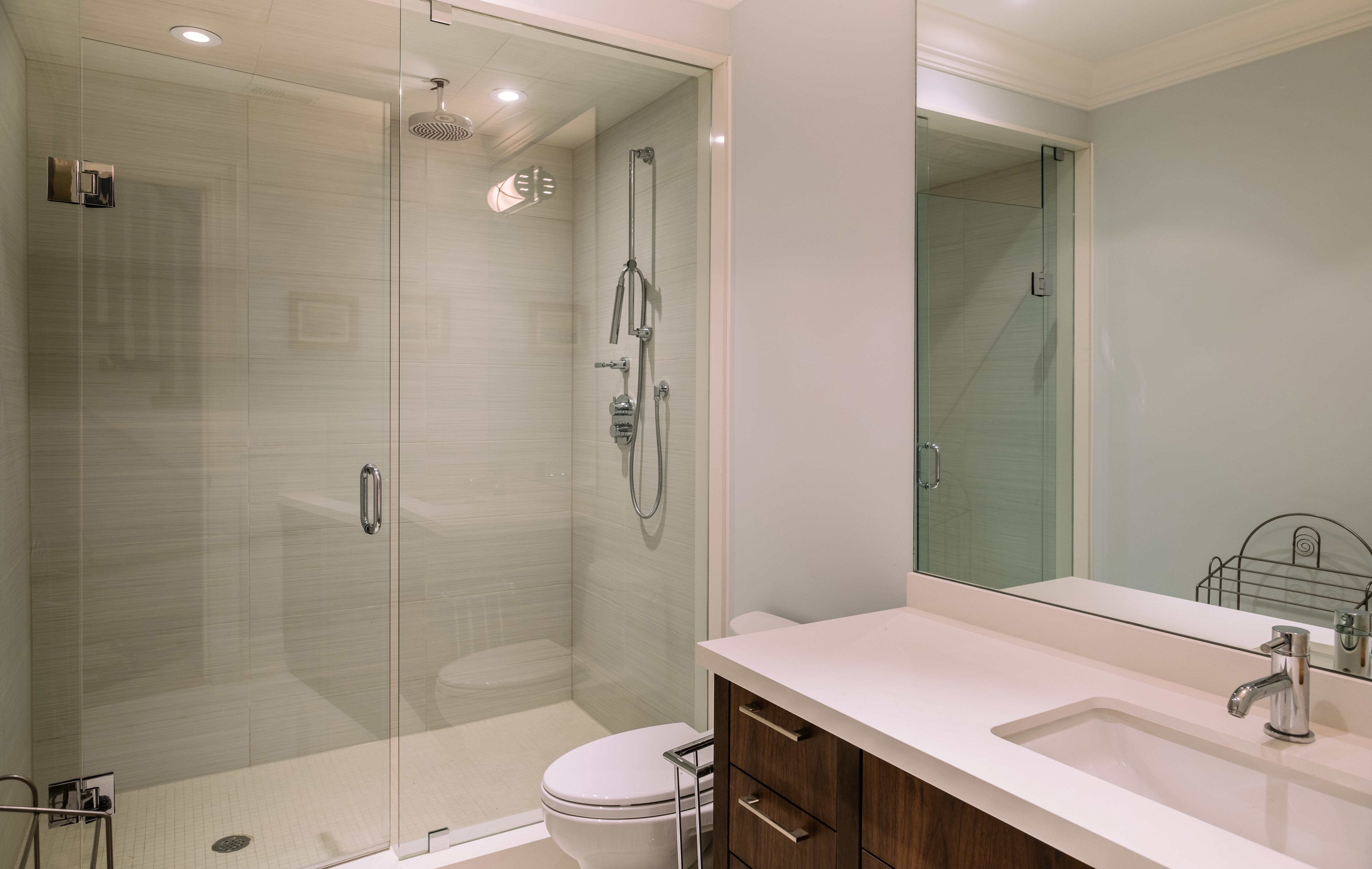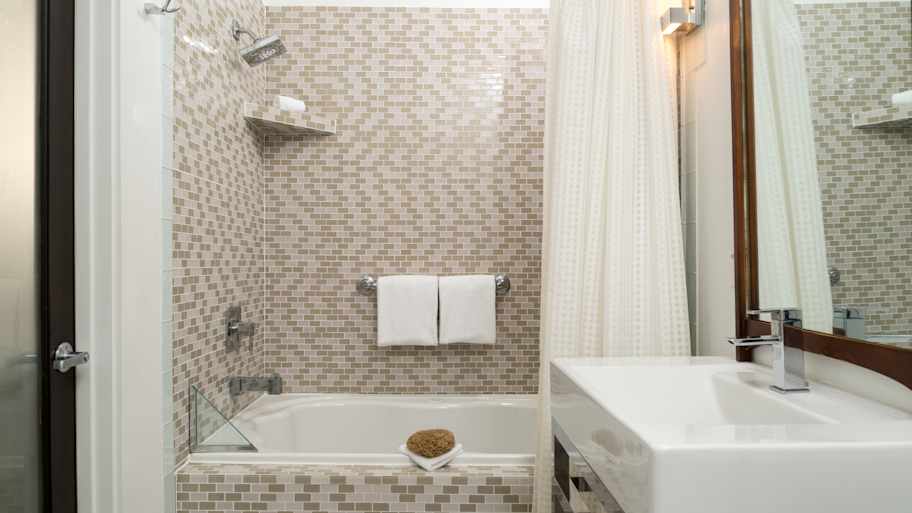
Remodeling your bathroom can add significant value to your home. Your bathroom remodel cost in Columbus, OH will depend on size, fixtures, materials, labor, and other factors.
They both get the job done, but one might be better for your budget, style, and sanity


Shower curtains are easier to install and replace.
Shower curtains can encourage mildew and wear out more quickly.
Glass doors look sleek but require more cleaning.
Glass doors are more expensive upfront.
Your decision to select a shower enclosure is more than a matter of looks, as it affects your budget, space, hygiene, and even daily comfort. In this guide, we’ll explore the real-world pros and cons of installing a shower curtain vs. glass doors. You’ll also get side-by-side comparisons based on cost, cleaning, appearance, and installation. Let’s find out which option fits your space, habits, and wallet.
The primary difference between a shower curtain and a glass door is how they manage water, cleaning, and daily use.
| Feature | Curtain | Glass Shower Door |
|---|---|---|
| Cost | $10–$50 (add rod + liner) | $400–$1,200+ installation fee |
| Installation | DIY in minutes | Typically needs a pro |
| Water Containment | Not as effective, can leak or splash | Excellent, tight fit |
| Cleaning | Liner must be replaced frequently | Glass must be wiped down regularly |
| Aesthetic | Wide range, seasonal, playful, neutral | Sleek, permanent, upscale |
| Durability | 6–12 months for liners | 20+ years with care |
| Space Utilization | Functions in all orientations | May need extra clearance to swing or slide |
Curtains excel in terms of price and flexibility, while glass doors excel in terms of containment and longevity.
A shower curtain is a lightweight, removable divider used to contain water within a shower or tub. It is typically made from materials like vinyl, cotton (lined), PEVA, or polyester. The curtain hangs from a rod on hooks or grommets, making it easy to move around, clean, and replace.
| Pros | Cons |
|---|---|
| Budget-friendly | Less effective at water control |
| Easy to install & replace | Can appear outdated |
| Variety of colors/patterns | Requires frequent cleaning |
Best for:
Renters
Families with kids and Elderly People
Short-term Use
Affordable and Accessible: Most plain curtains are under $20; even decorative designer collections are not much more than $60.
Flexible and Forgiving: Shower curtains are easy to install in curved tub shapes or small alcoves, allowing you to pull them aside to create a more spacious feel.
Easy to Update: With curtains, you can easily switch up your style seasonally. If you want florals in spring, stripes in fall, or kid-themed for the family bathroom, anything is possible.
Soft and Safe: Curtains are lightweight, making them safe for kids, seniors, or anyone who may bump into them.
Mildew Magnets: Research indicates that liner curtains become magnets for microbial growth within weeks if not washed frequently.
Leaks and Cling: Gaps between the curtain and the wall can lead to puddles, and the dreaded "shower curtain cling" can be troublesome.
Short Lifespan: Liners typically need to be replaced every 6–12 months, depending on usage and the type of construction.
Less Modern Look: Curtains may have a casual or mismatched look with modern interior decor if not carefully chosen.
A glass type of shower door is a hinged, sliding, or pivot-type door made of tempered safety glass, which is four to five times stronger than regular glass. The glass door serves as a semi-permanent solution to separate the wet and dry spaces in your bathroom.
| Pros | Cons |
|---|---|
| Sleek, high-end aesthetic | Higher upfront cost |
| Great water containment | Can be hard to clean |
| Adds resale value | Professional installation needed |
Best for:
Modern homes
Long-term renovations
Luxurious Visual Impact: Frameless glass creates an illusion of spaciousness in even tiny bathrooms by removing visual obstructions.
Improved Splash Control: With a well-sealed door, water remains where it's meant to, within the shower stall.
Long-Term Savings: Although more costly initially, these doors can last 15 to 25 years with minimal maintenance.
Boosted Resale Appeal: Research surveys show that bathrooms with glass doors are typically perceived as more "move-in ready" by potential homebuyers.
Higher Cost: The total cost, excluding installation, typically ranges from $500 to over $1,200, depending on the size, type of glass, and door style.
Cleaning Responsibility: Every splash, smudge, and shampoo drip becomes evident. This means daily or weekly cleaning is required.
Not Ideal for Small Rooms: Hinged doors need room to open, while sliders need horizontal clearance. Not every configuration is feasible.
Heavier and more difficult to install: Glass doors typically weigh between 60 and 100 pounds. Improper installation can lead to leaks or breakage.

Now let's put both the shower curtain and glass door in an ultimate showdown and see who comes out on top.
Glass doors will immediately improve the appearance of a bathroom. Their clean lines and glass panels create the illusion of more space, even in a modest-sized room.
Curtains are the hands-down winner in terms of price. Even with the addition of a liner and rod, you can usually outfit your entire shower for less money than a custom-cut glass panel.
A well-maintained glass shower door is designed to last. The tempered glass will never warp, fray, or absorb water. With occasional care, these doors tend to outlast other parts of the bathroom.
At first glance, curtains may seem easier to clean. Liners and fabric curtains can be placed into the washing machine or replaced entirely for a few dollars. Convenience is a key selling feature for many homeowners.
However, maintenance isn't completely trouble-free. Unless they are washed and dried regularly, curtain liners can develop mold, mildew, and a stubborn orange-pink biofilm at the hem, particularly at the bottom.
Installing a shower curtain is about as easy as it gets. Just pop a tension rod between the walls, slide on the curtain and liner, and you’re done; no tools, no drilling, no stress. This convenience makes it renter-friendly and completely reversible.
If you're looking for an Upgrade, consider hiring a local installer near you.
Curtains are made from a flexible material that allows them to move freely, making them feel more private, especially in a shared bathroom. Glass, on the other hand, can still reveal what's inside, even when using frosted or patterned options.
When something goes wrong with a curtain, swapping out a liner or rod takes minutes and requires no tools. It’s the ultimate DIY fix. Glass doors, on the other hand, require more skill. Replacing seals, aligning tracks, or fixing roller issues often calls for a professional.
Curtains are a better choice if you prefer an occasional, one-time clean. They require less frequent maintenance. While glass offers long-term cleanliness, it only if you’re consistent. Daily wipe-downs prevent buildup, but if neglected, glass can quickly become a high-maintenance feature.
Curtains, especially vinyl liners, are not very eco-friendly. They're made of plastics that won't break down. However, glass doors have a high initial investment; tempered glass and aluminum framing, on the other hand, last longer and are more recyclable at the end of their life.
Glass doors enhance the entire look of the bathroom. Homebuyers view them as a higher-end amenity that is fresh, modern, and ready to move into.
From average costs to expert advice, get all the answers you need to get your job done.

Remodeling your bathroom can add significant value to your home. Your bathroom remodel cost in Columbus, OH will depend on size, fixtures, materials, labor, and other factors.

An in-law suite can add value to your home and provide space for additional family members. Use this guide to get an idea of how much it will cost to build an in-law suite.

The cost to add a half bathroom varies based on geography and your choice of additions. Read on to discover just what factors into your total project cost.

Working from home is only productive if you have a dedicated office space. Learn the cost to build a home office, from materials to labor rates.

Ready for a bathroom refresh? If you’re considering a new tub, learn the pros and cons of some of the best bathtub materials on the market.

Small bathroom remodel costs depend on a number of factors—like what exactly you’re upgrading and the size of the room. This guide will help you budget.